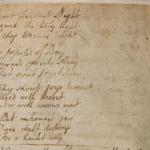Neither praise nor worship have a style. They are to be spontaneous, unrehearsed, and not synchronized with the way anyone else praises and worships the Lord. . .The most important thing is that we praise and worship the Lord when we come together. The thing to keep in mind is that His spirit flows more freely when worship is done spontaneously and freely. – comment on the Ponder Anew Facebook page
This is a common refrain from those who find liturgical worship too formal, rigid, or rote:
Worship must be spontaneous or it doesn’t count.
Biblically, we need look no further than the heavenly liturgy recorded in Revelation 4 to see this is clearly not the case.
Historically, referring specifically to corporate worship, pervasive spontaneity is an aberration. It isn’t the norm much of anywhere until hints in the revivals of the late 19th century, followed by the birth of the full blown Pentecostal movement on Azusa Street in 1906. By the middle of the 20th century, most Protestant denominations had a charismatic renewal movement taking place somewhere within its ranks. Later, the wholesale adoption of so-called “contemporary worship music” brought an uncomfortable mix of derivative jesusy commercial music and charismatic informality into both evangelical and mainline Protestant worship.
Combined with a culture in which formality and decorum are increasingly spurned, the church has grown to accept raucous energy and pent-up emotion as being a legitimate movement of the Holy Spirit.
But this is fraught with error.
The early church, its liturgical norms already as old as ancient Israelite custom, understood the irrevocable connection between corporate prayer (liturgy, gathered worship) and personal and collective Christian ethics. This connection was captured in the maxim lex orandi, lex credendi, “the rule of prayer is the rule of faith.”
Because corporate liturgy is a time of disciplined prayer, it is important that what we pray is refined, elegant, and elevated in structure, verbiage, and tone. Extemporaneous expression, even with the best intention, creates apertures in our liturgical architecture through which human error enters our worship. Though off-the-cuff, impromptu, and ad hoc language and structure is now the norm in American Christian expression, we are certainly all the poorer for it, both in character and ethic.
Furthermore, because gathered worship isn’t about our expressions of touchy-feeliness to God, but about God’s formative work in us through word and sacrament, it stands to reason that an ethos of seriousness and sobriety should guide our personal and collective worship. That isn’t to say that emotional response is off-limits. Not at all. But while present, they must be held captive underneath the anticipatory reverence for what Almighty God is offering His people.
Worship based on personal expression is me-worship. It is a self-absorbed, self-referential exercise. It is like the immature utterances of a group of small children, each intent on dominating the conversation.
It is an exercise in human futility.
Me-worship values casual, familiar, extemporaneous conversation. True worship values planned, refined, elegant speech, carefully crafted to write God’s message on our hearts. True worship prays truly.
Me worship creates good feelings and calls them God’s presence. True worship calls us to let go of our reliance on our false god-positives, and to take God’s word that the Holy Presence is not just with us, but is closer than we could ever imagine.
Some of you reading this will think it’s a stretch. I don’t.
I think careless, casual, impromptu worship is the greatest scandal in the American church.
It’s time for us to grow up, church.
It’s time for us to submit our personal stories to God’s grand story played out in historical, liturgical worship.
For even now, the heavenly host is worshiping God together with the age old hymn, which we are graciously invited to join:
Holy, holy, holy, Lord God Almighty, which was, and is, and is to come.
Photo: youtube screenshot














